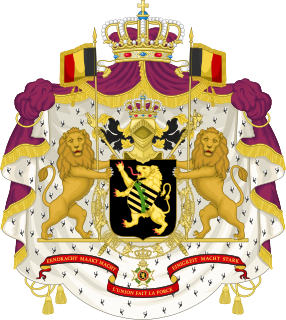
The Monarchy of Belgium is a constitutional, hereditary, and popular monarchy whose incumbent is titled the King or Queen of the Belgians and serves as the country's head of state. There have been seven Belgian monarchs since independence in 1830.
A decree is a rule of law usually issued by a head of state, according to certain procedures. It has the force of law. The particular term used for this concept may vary from country to country. The executive orders made by the President of the United States, for example, are decrees. In non-legal English usage, however, the term refers to any authoritarian decision. Documents or archives in the format of royal decrees or farming were issued by rulers.
The Order of the Crown is a national order of the Kingdom of Belgium. The Order is one of Belgium's highest honors.
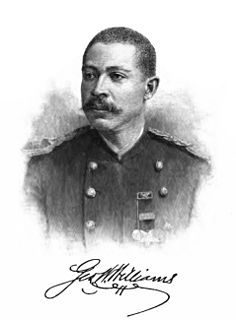
George Washington Williams was an American Civil War soldier, Baptist minister, politician, lawyer, journalist, and writer on African-American history.

Belgium controlled two colonies during its history, the Belgian Congo from 1908 to 1960, and Ruanda-Urundi from 1922 to 1962. It also had a concession in China, and was a co-administrator of the Tangier International Zone in Morocco.
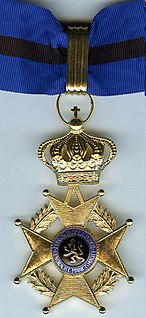
The Order of Leopold II is an order of Belgium and is named in honor of King Leopold II. The decoration was established on 24 August 1900 by Leopold II as king of the Congo Free State and was in 1908, upon Congo being handed over to Belgium, incorporated into the Belgian awards system. The order is awarded for meritorious service to the sovereign of Belgium, and as a token of his personal goodwill. It can be awarded to both Belgians and foreigners, and is seen as diplomatic gift of merit.

Albert Thys was a Belgian businessman who was active in the Congo Free State. He gave his name of Thysville to the station of Sona Qongo, currently Mbanza-Ngungu in Bas-Congo.

The Central Bank of the Congo is the central bank of the Democratic Republic of the Congo. The bank's main offices are on Boulevard Colonel Tshatshi in La Gombe in Kinshasa.

The National Bank of Rwanda is the central bank of Rwanda. The bank was founded in 1964. The current governor of the bank is John Rwangombwa.

The Bank of the Republic of Burundi is the central bank of Burundi. The bank was established in 1966 and its offices are in Bujumbura.
The Royal Order of the Lion was established by King Leopold II of the Belgians on 9 April 1891, in his capacity as ruler of the Congo Free State, and was awarded for services to Congo and its ruler that did not deserve the award of the Order of the African Star and were not necessarily performed from within the Congo. It was incorporated into the Belgian honours system following the annexation of the Congo Free State by Belgium. The motto of the Order is "Travail et progrès". The King of the Belgians is its Grand Master. Even though Congo is no longer a Belgian colony, it is still considered to be a Belgian Order, although it is no longer awarded.
In Belgium, a decree is a form of legislation passed by community or regional parliaments, except by the Brussels Parliament.

Félix Alexandre Fuchs (1858–1928) was a Belgian colonial civil servant and lawyer who served as Governor-General of the Belgian Congo between 1912 and 1915.
The Civil Order of Savoy was founded as an order of knighthood in 1831 by the King of Sardinia, Charles Albert, Duke of Savoy. The intention was to reward those virtues not belonging to the existing Military Order of Savoy, founded by Vittorio Emanuele I in 1815. The order has one degree, that of Knight, and is limited to 70 members. Admission is in the personal gift of the head of the House of Savoy.
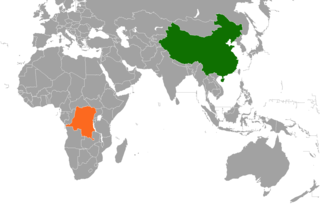
The People's Republic of China (PRC) and the Democratic Republic of the Congo (DRC) have had peaceful diplomatic relations, and growing economic relations, since 1971. Relations between the two countries go back to 1887, when representatives of the Congo Free State established contacts with the court of the Qing dynasty then ruling China. The first treaty between the two powers was signed in 1898. The Free State became a Belgian colony in 1908, but when it gained its independence in 1960 it established formal relations with the Republic of China (ROC), which had replaced the Qing in 1912 but was relegated to the island of Taiwan after 1949. Over the next decade, Congolese recognition was switched several times between the ROC and the PRC before it settled finally on the latter in 1971. At the time, the Congo was known as Zaire. In the 21st century, Chinese investment in the DRC and Congolese exports to China have grown rapidly.
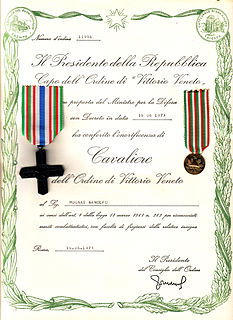
The Italian honours system is a means to reward achievements or service to the Italian Republic, formerly the Kingdom of Italy including the Italian Social Republic.

The Service Star was a civil decoration in the Congo Free State created by a decree of the king-sovereign, Leopold II, on 16 January 1889. It was given to those non-natives who faithfully and honorably completed a term of service in the Congo. It was the second decoration in terms of precedence, the Order of the African Star, introduced seventeen days earlier, being the first.
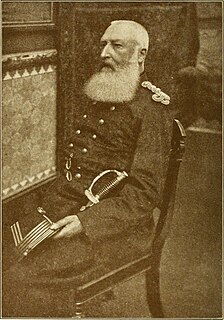
In the period from 1885 to 1908, many well-documented atrocities were perpetrated in the Congo Free State which, at the time, was a colony under the personal rule of King Leopold II of the Belgians. These atrocities were particularly associated with the labour policies used to collect natural rubber for export. Together with epidemic disease, famine, and a falling birth rate caused by these disruptions, the atrocities contributed to a sharp decline in the Congolese population. The magnitude of the population fall over the period is disputed, but it is thought to be between one and fifteen million.














